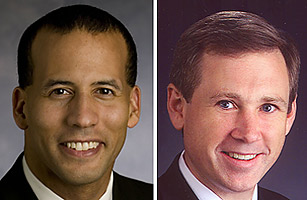
Dan Seals, left, and Mark Kirk are vying for the Illinois 10th Congressional district seat.
Two years ago, Republican Mark Kirk, 49, barely survived a political novice's challenge for his Congressional seat representing one of the Windy City's most affluent suburbs. Now, in a rematch of that contest, Kirk finds himself in an even trickier position in what is emerging not only as one of the country's most expensive Congressional races, but in many ways a last stand for moderate suburban Republicans.
Kirk and his challenger for Illinois' 10th Congressional district seat, the Democrat Dan Seals, have raised roughly $7 million combined in a tight race that the Cook Political Report has called a toss-up. The two men are investing that money heavily on increasingly blistering Internet and prime-television ads, with Seals attacking Kirk for displaying unchecked loyalty to President Bush by casting votes supporting the war in Iraq. Kirk, meanwhile, has bought ads dismissing as a desperate "campaign stunt" Seals' move last spring (when gas was going for about $4.14 a gallon) to offer gas for $1.85 per gallon—roughly the price it cost when Kirk assumed office seven years ago. If Seals manages to beat Kirk, and recent polls show him to have a small lead, he probably, more than most Democrats running for Congress, has Sen. Barack Obama to thank.
Seals, 37, is a business consultant and Northwestern University public policy lecturer whose multiethnic background somewhat mirrors Obama's. He was raised in the intellectual Chicago enclave of Hyde Park by parents of black, Native American and Scotch-Irish Heritage, and he is married to a Japanese-American woman. In 2006, the Illinois senator campaigned for Seals, who captured 47% against Kirk's 53%, and this year Obama has again endorsed Seals.
"Ordinarily, an incumbent with as high approval ratings as Mark Kirk would be nowhere near in trouble," says David Wasserman, the Cook Political Report's House editor. "But when voters look at the ballot, and realize that in voting for Kirk they'd be voting for someone playing on the opposite team from Obama, they will have a harder time casting a ballot for him."
That is, of course, assuming Obama supporters actually show up at the polls, which is not a given. Many political observers warn that Obama supporters may not feel compelled to vote largely because this state is expected to go so overwhelmingly for its adopted son.
And despite Obama's endorsement, Seals faces some key challenges, starting with the perception that he is too liberal, and lacks experience necessary for the job—he's never, in fact, held public office. In endorsing Kirk last week, the Chicago Tribune pointed to another potential problem for Seals: He doesn't actually live in the 10th Congressional district. In an interview with TIME last week, Seals said he lives just one block from the 10th district''s boundary. His children attend schools within the 10th district, and he pays taxes there, he said. "The question becomes: Is that block more important than the vast policy issues that are between us?" Seal asked, before listing several policy areas on which he differs from his challenger, such as the wars in Iraq and Afghanistan, and how to resolve the financial crisis.
By most accounts Kirk, whose campaign didn't return calls seeking comment for this article, is popular in his district. Educated at Cornell and the London School of Economics, Kirk for several years was an aide to John Porter, a Republican who represented the 10th Congressional district for two decades. Kirk was elected to succeed Porter in 2000, and he quickly positioned himself as a centrist, particularly on social issues. On abortion, for instance, political observers say he supported bringing to the House floor measures that would restrict abortions, but in the end, would often cast "present" votes on such measures, or opposed them. Wayne Steger, chair of the political science department at DePaul University, says such posture "creates a problem for him because neither the ardent pro-lifers nor the ardent pro-choice activists are satisfied. He is criticized by both sides." In 2005, Kirk further burnished his centrist credentials by voting with Democrats in favor of a bill that would have repealed restrictions on embryonic stem cell research, though earlier that year he voted with his party on a bill granting federal courts jurisdiction in the contentious Terri Schiavo case.
"Some of the television ads in recent weeks have asserted that Seals, if elected, would support measures to significantly increase taxes. In the interview, Seals said he had actually proposed to simplify the tax code and lower taxes by $1,500 per person. Seals said of his opponent: "He''s got to find some way to scare people away from us."